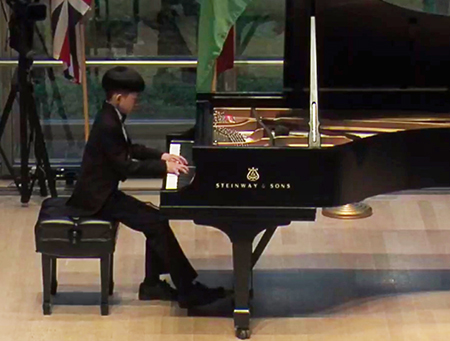by Daniel Hathaway

First, a rundown on the semifinal performances by those who weren’t advanced by the jury to the final concerto round on Friday evening with Gerhardt Zimmermann and the Canton Symphony Orchestra.
JUNIORS
Catherine He (14, Canada) began with a strongly articulated performance of Bach’s Prelude and Fugue in E-flat from the Well-Tempered Clavier I, then settled impressively into Schumann’s ABEGG Variations after a slightly tentative beginning. Her realization of the toccata-like moments in Prokofiev’s Sonata No. 3 was bold, her playing of Liszt’s Valse-Impromptu lithe and expressive.
Katherine E. Liu (13, USA) played Bach’s WTC II D-minor Prelude with an even touch, and balanced voices expertly in the Fugue. Her slowish tempo at the beginning of Beethoven’s “Appassionata” Sonata contrasted starkly with her speedy pace in the Allegro. Liszt’s Un Sospiro, Barber’s Nocturne (homage to John Field), and Chopin’s Ballade No. 2 received expressive, sympathetic readings.
Seungmin Shin (13, South Korea) brought a light touch and breezy tempos to the outer movements of Bach’s Italian Concerto, and took an expansive view of Ravel’s Jeux d’eau. Her treatment of Chopin’s Rondo in E-flat was diaphanous, if a bit blurry.
SENIORS
David Khrikuli (17, Georgia) adopted an aggressive approach to Chopin’s Ballade No. 4, and his performance of Liszt’s Sonata in b — which built to a thundering climax after just a few bars — was a case of too much, too soon. In between, Ravel’s Oiseaux tristes sounded more threatening than doleful.
Arthur Wang (17, Canada) began with a Romanticized performance of Bach’s WTC I Prelude and Fugue in c-sharp, unleashed all his firepower on parts of Liszt’s “Dante” Sonata, and then turned in a muscular and rhythmically pristine reading of Prokofiev’s Sonata No. 7. Schubert’s G-flat Impromptu was an island of calm in his set.
Ryunosuke Kishimoto (16, Japan) played Bach’s WTC II Prelude and Fugue in b with cool elegance and brought colorful nuances to Schumann’s Allegro in b. Clarity marked his performance of Chopin’s Scherzo No. 1, and well-balanced strength distinguished his playing of Liszt’s Ballade No. 2.
Uladzislau Khandohi (16, Republic of Belarus) ended Wednesday evening’s session appropriately with an evocative reading of Ravel’s Gaspard de la Nuit. He preceded that with an introspective and lyrical performance of Bach’s WTC II Prelude and Fugue in f-sharp, and a lyrical, freely-wrought version of Chopin’s Ballade No. 4.
Late on Wednesday evening, the jury advanced Yunchan Lim, Eva Gevorgyan, Hao Wei Lin, Jiwon Yang, Xiaoxuan Li, and Shuan Hern Lee to the finals.
As it turned out, the six finalists would be performing only two different pieces at the Maltz Performing Arts Center on Friday — the opening movements of Grieg’s Concerto and Chopin’s Second Concerto. While adapting to three different interpretations of each may have made things more complicated for Zimmermann and the Orchestra, hearing multiple versions of the same piece allowed for some interesting comparisons.
JUNIORS



SENIORS



Published on ClevelandClassical.com June 11, 2018.
Click here for a printable copy of this article


